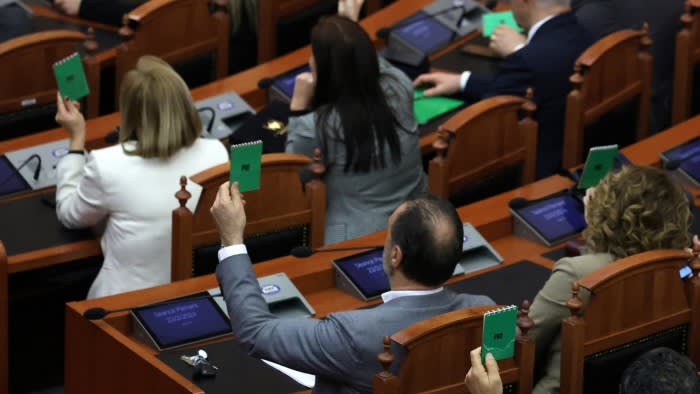Albania has ratified a migration deal with Italy that allows Rome to hold asylum-seekers in the non-EU country — the last big hurdle for a controversial scheme apparently inspired by the UK’s immigration agreement with Rwanda.
The parliamentary vote on Thursday came less than a month after Albania’s constitutional court ruled that the deal, first unveiled in November, did not contravene Albanian laws despite opposition calls for more consultation and concerns over human rights.
The deal sets a new precedent for people seeking protection within the EU to be held outside the bloc while their claims are assessed. Italy’s parliament has already ratified the plan.
The deal reached last year by Italian Prime Minister Giorgia Meloni and her Albanian counterpart Edi Rama allows Italy to build two migrant holding centres in Albania, an EU candidate country and one of Europe’s poorest nations.
Italy aims to process 36,000 people a year through the centres, which will be able to house a total of 3,000 people.
“Albania is choosing to act like an EU member state and agreeing to share a burden that Europe should face united as a whole,” said Rama in a post on social media site X after the vote. “No country can solve such a challenge alone.”
The scheme is fundamentally different to the UK’s stalled Rwanda plan, analysts said, as the two centres will remain under Rome’s full jurisdiction and those deemed eligible for asylum will be allowed to go to Italy.
“The main goal is deterrence. They want to convince people that the Italian asylum system is not that welcoming any more,” said Luca Barana, a research fellow on migration policy at Rome’s Institute of International Affairs.
“But I don’t think it will be that effective. Deterrence doesn’t work, especially in the long term,” he added, warning that the Albanian centres could face legal challenges from asylum seekers.
The cost of building and operating the detention centres — to be borne entirely by Italian taxpayers — is estimated at €53mn this year, rising to €600mn over the deal’s initial five-year timeframe, according to the Italian government.
“It’s a huge waste of money,” said Lia Quartapelle, an Italian lawmaker with the opposition Democratic party. “It’s just a huge electoral ad.”
Several international bodies criticised the deal, with the Council of Europe saying it “raises several human rights concerns and adds to a worrying European trend towards the externalisation of asylum responsibilities”.
The council cited several concerns over fairness of asylum procedures, identification of vulnerable people, the possibility of automatic detention without adequate judicial review, inadequate detention conditions and a lack of access to legal aid.
Amnesty International said the agreement would “create an unlawful and harmful system” that would “increase people’s suffering”.
Meloni won elections in 2022 promising tough measures to curb drastically the number of migrants arriving in Italy from across the Mediterranean, and her government imposed tough restrictions on charities carrying out humanitarian rescues of those at risk of drowning.
More than 155,750 irregular migrants arrived in Italy last year, a rise of 50 per cent over the previous year, and the highest level since the peak of the European migration crisis in 2016, interior ministry data shows.
The prime minister also came under fire from her coalition partner Matteo Salvini, leader of the far-right League, who demanded tougher action to stop the inflows.
In recent months, the pace of irregular arrivals has slowed sharply, with 4,368 people arriving so far in 2024, down from 12,903 over the same period last year.
But after the Tirana vote a coalition of humanitarian groups working to protect migrants at sea said Rome’s restrictions on Mediterranean Sea rescues — including the impounding of nine humanitarian rescue boats on 16 occasions, for a total of 300 days — had contributed to an increase in deaths last year.
According to the International Organization for Migration, 2,500 migrants drowned or went missing in the Central Mediterranean in 2023, up from 1,417 the previous year.
“This deliberate obstruction of the life-saving activities of NGOs takes place in an environment in which search and rescue capacity at sea is already grossly inadequate . . . and has disastrous consequences,” said a statement signed by groups including Médecins Sans Frontières.
Gazment Bardhi, an Albanian MP from the opposition rightwing Democratic party who led the unsuccessful appeal to the constitutional court, said: “We [have to be] very careful not to have a second Lampedusa in Albania,” referring to the Italian island that was overwhelmed by the arrival of thousands of migrants in a single week last year.
He added that he was “quite sure” some migrants would raise the issue at the European Court of Human Rights.





























